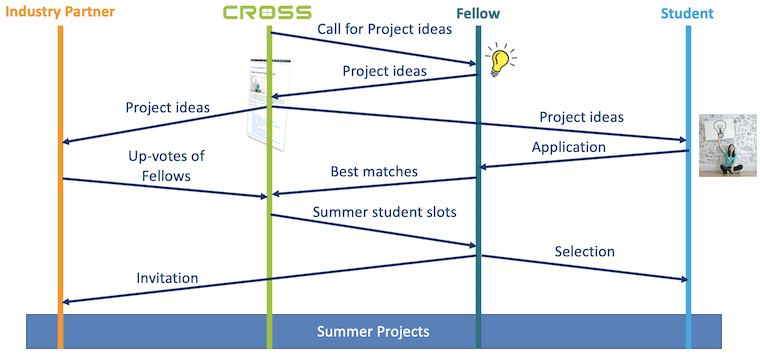Every quarter many students at UC Santa Cruz are looking for good project ideas for class, summer, senior, masters, or Ph.D. projects. But until recently, there does not seem to exist any kind of school-wide directory that facilitates matching students to project ideas -- even though research groups at UC Santa Cruz have plenty to offer in terms of ideas, mentorship, and their ability to raise funding.
Inspired by Google Summer of Code, on Tuesday, June 30, 2020 CROSS kicked off the Open Source Research Experience (OSRE) for Summer 2020, a market for open source project ideas that matches students to mentors and engages members of industry to fund and participate in student summer internships (slides, video). The benefit for industry partners are identification of potential recruits, encouragement of open source project curation visible to industry, encouragement of open source practices in research, and early access to technologies in research prototypes. The benefit for students is the opportunity to work with mentors who are genuinely interested in outcomes and to get exposed to technologies that can significantly improve their job opportunities. OSRE is also rounding out the mission of CROSS to educate students in that it not only jumpstarts developer communities in open source projects but also provides highly relevant open source experience to undergrads.
How does it work?
The Open Source Research Experience for Summer 2020 begins with CROSS issuing a call for project ideas to its fellows. Fellows respond with project ideas that are published on the Open Source Project Ideas website (uccross.github.io/projects). The website is advertised both to students and to industry partners. Students who are interested in particular project ideas contact the associated mentor and eventually apply for it. Fellows communicate their best matches to CROSS. In the meantime, industry partners can help support this program by "up-voting" CROSS fellows to signal their interest in particular project idea portfolios. An up-vote costs $9,500 which CROSS will use to fund student summer internships, prioritizing students matched to project ideas by the most up-voted CROSS fellows.The fellow then selects the best student matches and invites industry to participate.
CROSS aims to prioritize assignment of summer student slots to fellows who received the most up-votes. Depending on availability of funding, CROSS might assign additional student slots to other fellows or convert them into funding for students who are available in the fall. Once student slots are assigned to fellows, they make the final selection of students to fund. The prioritization combined with the indirection of up-voting a fellow instead of a project idea ensures that the most relevant work is funded most and fellows get to work with the best matching students.


